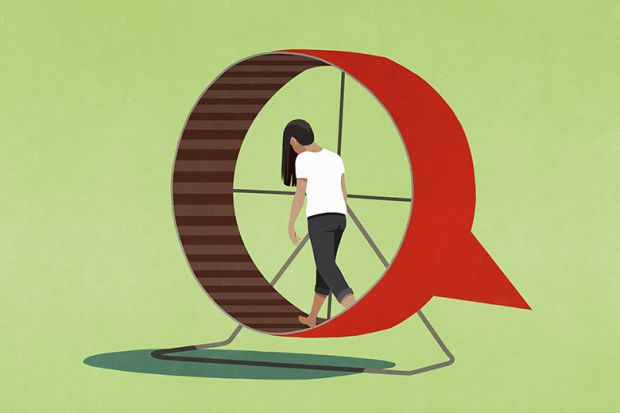For many workers, the Covid pandemic had at least one positive: the rise of homeworking. The ability to juggle work and personal commitments in the same location has reputedly improved work-life balance for multiple millions of people around the world.
University staff are certainly in need of some help on that front. Times Higher Education’s first global work-life balance survey, carried out in late 2017 and published in early 2018, revealed a culture of overwork and signs of deep unhappiness, particularly among academics. So are university staff feeling any better about their lot now? To find out, THE conducted a new work-life balance survey in September.
The nearly 1,200 responses from more than 70 countries suggest that flexible working has indeed improved work-life balance. But workloads remain a huge problem, affecting mental health, relationships and holidays. And if the 44 per cent of respondents who say they are likely to leave higher education in the next five years because of their excessive workload follow through with their intention, the workload for those who remain could become even heavier.
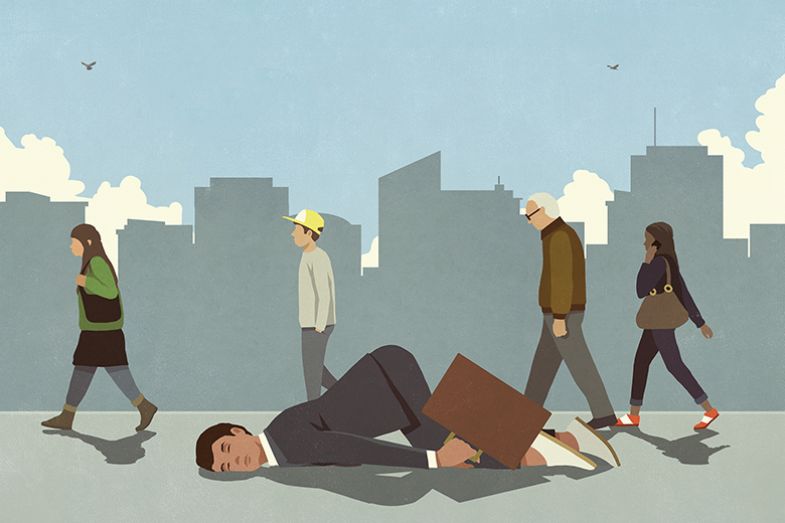
Flexible working
A full 79 per cent of respondents agree that flexible working or working from home improves their work-life balance, 49 per cent strongly agree. While 67 per cent of all respondents identify as female, women are not hugely more likely (80 per cent) than men (74 per cent) to be more positive about the benefits of homeworking. Administrative staff (83 per cent) are more likely than academics (77 per cent) to appreciate it.
Evidence of increased flexibility in where work is done is demonstrated by the number of days respondents now attend their universities in person. Nearly a quarter (23 per cent) still travel in for five days – and some also say they go in at weekends. But 50 per cent now go into work only three days a week (26 per cent) or fewer. Respondents in Asia and North America are far more likely than peers in other countries to travel to places of work more often. For example, 62 per cent of Asian respondents are still going in five days a week, compared with 14 per cent of those in the UK.
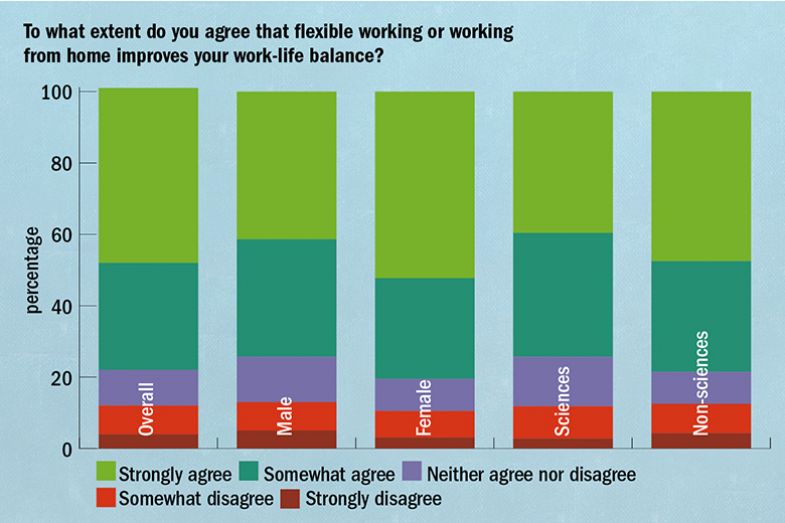
It is also noticeable that men (34 per cent) are more likely than women (19 per cent) to travel for the full five days of a working week. Understandably – given the need to spend more time in laboratories – those who work in the sciences also commute more often.
Academics often have quite long commutes (23 per cent say it takes them more than an hour to get to their university), and nearly two-fifths (38 per cent) see this as wasted time, compared with the 22 per cent who value the exercise opportunity and 20 per cent who feel it is a relaxing time to be alone. Hence, time saved by not commuting is widely valued – even if it is generally spent working. For instance, a male senior leader in the UK is now going into his university only two days a week. “This has made a massive difference to work-life balance and saved me between six-10 hours a week, meaning that I’ve been able to revive my research despite holding a heavy leadership role,” he says.
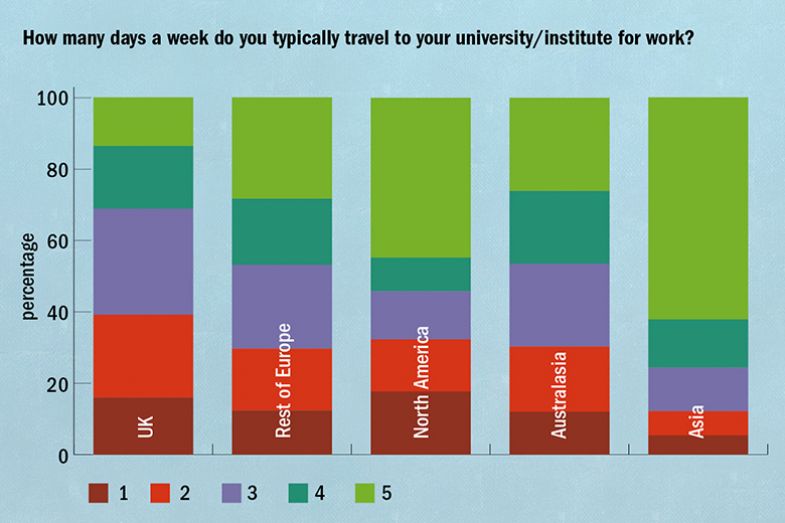
But senior leaders are also widely perceived to be a threat to ongoing homeworking. A female Canadian lecturer in arts and humanities has “had to become fairly vocal in order to secure the ability to work remotely as much as I do” in the face of administrative pressure. But others – particularly administrative staff – bemoan their institutions’ continued caution in keeping staff away from the office. A UK-based research support professional “hates” working from home: “It’s the reason I do not switch off, now that home has become my workplace too.”
This blurring of the lines between work and home life is a much-repeated concern despite the perceived benefits of flexible working. “Having the laptop at home makes it much harder to shut the door on it and ignore the demands of work. The pressure is always there to check emails, etc,” says a female UK-based communications professional.
There is a common sense that a balance between home and office working is the way forward. “I love working from home and just coming in to connect with workmates,” says a female Australian communications and marketing professional. “I get more done at home and feel it gives me that balance that was missing before – travelling over two hours per day and the time it wasted is a relief I never want to see taken away.”
Workload
Being able to get more done at home is possibly just as well given the workloads that university staff are facing. Academics appear to be struggling with their workloads at least as much as they were five years ago, while professional staff feel more under pressure than ever.
Overall, 23 per cent of respondents report working more than 10 hours every day, for instance, meaning their regular working week exceeds the 35 to 40 hours specified in standard employment contracts. Another 26 per cent work between nine and 10 hours.
“An academic workload cannot be fitted into a normal working day – it’s just impossible,” says a male UK-based psychology professor.
Overwork is reported across job categories, although professional and support staff are more likely to keep to regular hours, with 40 per cent saying they clock between seven and eight a day, compared with only 15 per cent of academics. Conversely, 28 per cent of academics work more than 10 hours, compared with 12 per cent of professional and support staff. Women and scientists are slightly more likely than men and non-scientists to work excess hours. Long working days are reported all over the world, but respondents in Asia report the longest, followed by participants in Australasia and North America.
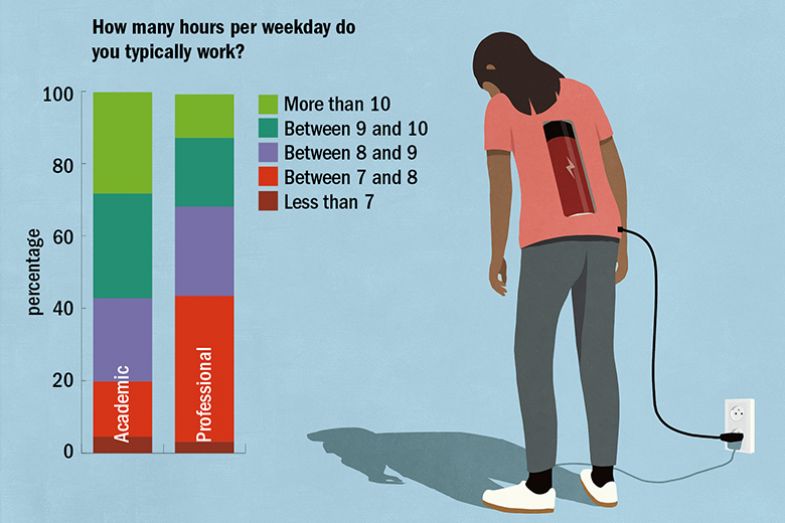
Most respondents stress that the hours they feel they need to work vary across the academic year, with major assessment initiatives such as the UK’s Research Excellence Framework driving up workloads ahead of crucial deadlines.
The blurred boundaries between work and social lives brought about by the increase in online working are also seen as a driver of longer hours, while some respondents specifically blame online working for increasing their workloads. A Germany-based professor in arts and humanities, for instance, says that digitising her lectures is very time-consuming.
Respondents to THE’s 2017 survey are 12 percentage points more likely to say they worked more than 10 hours a day than our 2022 respondents, but the latter do not consider their working days to have shortened.
Asked to compare their situation now with that of three years ago, 41 per cent say their hours have increased, while only 12 per cent say they work less. Respondents in the UK and Australasia are the most likely to report increased hours. Although academics are more likely than professional and support staff to report working more than in 2019, a third of professional staff are also working longer hours now.
Work also seeps into weekends, with a quarter of respondents saying they regularly work more than five hours over Saturday and Sunday. Half of professional staff say they do not have to work at all at weekends, compared with just 13 per cent of academics. Men are more likely to work longer hours at weekends than women. Again, a big majority (83 per cent) say their hours at weekends have stayed the same or increased in the past three years. Nearly half of those in Australasia (44 per cent) say they work more hours at weekends now than they did in 2019.
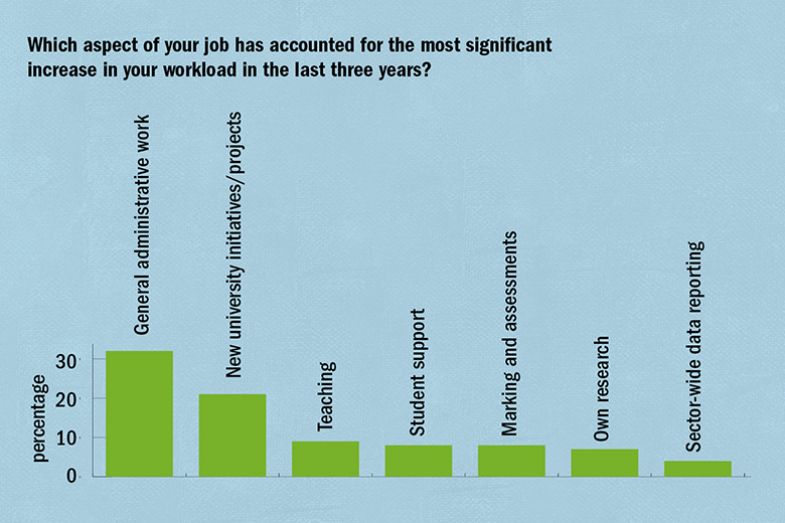
An assistant professor based in Pakistan says her weekends are used to prepare for lectures and marking, while a female education professor in Australia says her weekdays are “consumed by teaching and mainly useless meetings”, so weekends are useful to write grant applications and keep up with research. Some respondents say they feel a need to work at weekends but are too exhausted to do so.
Many of those who report working fewer hours stress that the reduction often resulted from their having to prioritise their health, sometimes after experiencing burnout.
“I am now refusing to work the excess hours expected of me by my employer. This means that large parts of my work do not get done, and it is principally research that I have had to cut back on or abandon,” says a male UK-based lecturer in arts and humanities, while a female student recruitment and admissions officer based in the UK says she has “learnt from past experience that you get no thanks or are not valued any more for putting in the additional hours – so I’ve learnt to cut back”.

Downtime
Despite the workload pressures, half of all respondents say they can switch off at least some of the time, although a quarter say they can never leave work behind completely. Academics are much more likely than professional and support staff to say they can never switch off (28 per cent versus 14 per cent) but are also more likely to say they can switch off some of the time (52 per cent versus 44 per cent). North America and Australasia have the highest proportions of workers who feel constantly “on”.
The unique nature of academia as a career is a key factor, with some academics saying they don’t want to switch off from a job they love. Others, however, just can’t help themselves. “I don’t sit down at my laptop, but that doesn’t mean that I don’t think about my research at the weekends. So it’s hard to know if I’m always working or actually having time off,” says a female social scientist in Australia. A male UK research fellow in engineering, meanwhile, feels he has no option but to engage at weekends: “Just keeping up to date with the literature is very difficult, not to mention coming up with great novel ideas for research.”
Those in senior leadership positions and holding full professorships are slightly more likely to report being unable to switch off than the average. Yet they, too, feel somewhat besieged. A male UK-based professor in arts and humanities says, “Colleagues and students expect immediate answers on all sorts of things, ranging from serious to trivial”, and this demand quietens only for “a few days around Christmas”. And a fellow professor notes that “urgent situations tend to arise even during holidays, and in academic and leadership roles it is difficult to delay dealing with them”. Delegation is not always effective because “people are sometimes reluctant to make decisions on your behalf”.
In 2017, professional and support staff were 17 percentage points more likely to report that they worked while on holiday (86 per cent) than their non-academic colleagues. The difference between the two groups is smaller this time, and the figures for both have increased: to 93 per cent and 83 per cent, respectively. A quarter of this year’s respondents spent between a fifth and two-fifths of their most recent holidays working (including answering emails), while some comment that they do not feel able to take all their allotted annual leave in the first place.
As well as feeling the need to be contactable even when on holiday, respondents also report fears about the scale of the workload that awaits when they return from leave.

Mental health
“Some aspects of work (ie, adjusting to stressful administrative decisions) have a strong negative effect on my mental health, and other aspects (ie, feeling like I’m contributing to society through my teaching and research) have a strong positive effect,” says a female assistant professor in business and economics based in Canada.
When considering their mental health, several respondents speak of a similar dichotomy, with love for the job and the fulfilment gained from teaching and research weighed against workload, job insecurity and feelings of lack of control.
But poor mental health deriving from excessive workloads is having a very real effect. It has caused 29 per cent of respondents to take time off, while many more have felt as if they should but worried about the potential career consequences of doing so. The highest rates of mental health-related absence are found in Europe (which, for the purposes of this analysis, excludes the UK) and Australasia. Women are six percentage points more likely than men (30 per cent versus 24 per cent) to have taken time off, and administrators (32 per cent) are five percentage points more likely than academics (27 per cent).
That last statistic sits a little oddly with the fact that academics (74 per cent) are 10 percentage points more likely than professional and support staff to say that working in higher education has a negative effect on their mental health.
“We have been consistently under-resourced all year and it is taking its toll on my team and me,” says a female UK-based administrator working in online delivery. “Additionally, while we are responsible for a number of business-critical tasks and student and staff support, we have some of the oldest laptops in the business, which means everything takes twice as long as it should.”
There is also considerable variation in responses by geography, with 55 per cent of respondents in both Europe and Asia agreeing that their job worsens their mental health, compared with 82 per cent in Australasia.
Friends and family
For some in the sector, the flexibility of their job opens up social opportunities that might not exist in other sectors. For instance, a UK-based female administrator, who works in quality assurance, is able to “work later on other days in order to finish at 5pm to meet friends. I am lucky to have flexibility in my work and autonomy to manage my tasks and workload with minimal supervision.”
Overall, however, 68 per cent of respondents agree that working in higher education restricts people’s ability to see their friends and family as much as they would like, while only 20 per cent disagree. Less than half (48 per cent) agree that their job gets in the way of conducting successful relationships, although many comment that their partners also work in academia and therefore have similarly long hours.
The pursuit of academic positions in far-flung locations is one obvious barrier to spending time with loved ones, but respondents also speak of feeling too tired to socialise and needing to spend time off “recovering”. “My job is largely the reason I don’t really have friends,” says a UK-based female professor in the humanities.
Women are more likely than men to feel they are missing out on time with loved ones, but more men than women feel that their jobs undermine their ability to conduct a successful relationship with a partner. Academics are more likely than professional staff to agree with these statements, especially those (74 per cent) in non-science subjects, which are more female-dominated in our sample. However, the proportion of professional staff agreeing that their job gets in the way of spending time with friends or family has risen from 32 per cent in 2017 to 54 per cent, while the proportion of academics who believe their job gets in the way of their relationship has dropped from 72 per cent to 54 per cent.
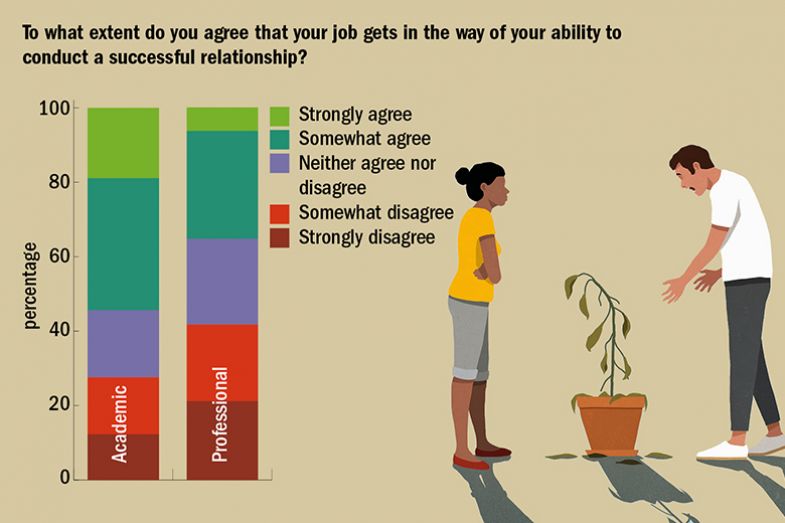
“My partner and I have had arguments about my work and inability to switch off,” says a Canadian female professor in education. “I’ve had to try and prioritise boundaries. I do worry about the impact on my career, where the expectation is to be always on.”
But having a relationship or caring responsibilities is also the excuse some need to force them to reassess their priorities. “Before I was married I worked all the time,” says a New Zealand-based assistant professor in education. “Taking time to prioritise my relationship has required some retraining on my part. Although harder to juggle, I think in some ways my colleagues with children are better at putting family first and maintaining some boundaries to their academic lives.”
Asked to compare their situation with others, exactly half (50 per cent) agree that most of their friends seem to enjoy a better work-life balance than they do, with agreement highest in Australasia and the UK. Only 22 per cent disagree – in some cases because their friends are also academics.
Moreover, while there is recognition that many other sectors suffer from problems with work-life balance, there is a feeling that friends are better remunerated for it and are often better supported by their workplaces.
“It’s an eye-opener talking to people in the private sector about how they develop, support and encourage their staff. I can’t remember the last time someone in management said to me ‘thanks’ or ‘well done’. It erodes your sense of self-worth,” says a female UK-based lecturer in social sciences.
Among respondents with children or other caring responsibilities, 40 per cent say they feel their career has been held back because of their caring responsibilities. While 44 per cent of women feel this way, only 34 per cent of men do – but that figure is significantly higher than the 25 per cent recorded in 2017.
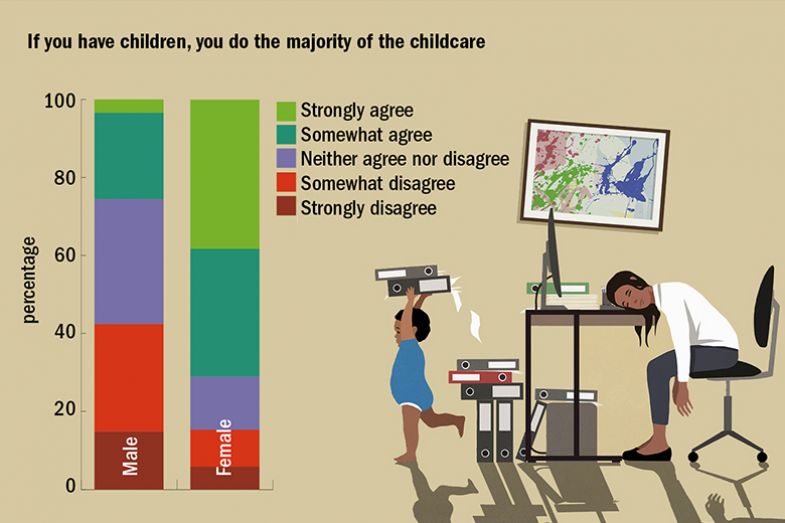
For single parents, the problems are more acute: “I cannot leave the city to engage in conferences, external examining etc. Therefore, I have been turned down for promotion because I cannot tick the ‘wider engagement’ box in our career progression framework,” says a UK-based female lecturer in life sciences.
Of those who do not intend to have children, 42 per cent say the decision is because of fears that parenthood would be incompatible with their careers. Again, women (45 per cent) are more likely than men (33 per cent) to take this view.
“In my thirties, I was worried that having children would make it very hard to be successful in academia. And looking at friends and colleagues in HE, there is truth to this,” says a UK-based female professor in economics and business.
“I put off having kids because I was told by my department head that it would negatively impact my career. This was extremely unhelpful and I had great difficulty starting a family late,” says a female Australian professor in social sciences.
Predictably, women are more than twice as likely as men to say that they do most of the childcare, although there are exceptions.
“My partner does the majority of the childcare and I regularly miss time with my son to work,” says a female postdoc in the UK, who is “considering leaving academia because of the combination of workloads and precarity”.

Job security
Broadly, respondents feel that their jobs are secure: 68 per cent agree or strongly agree that they do, while 18 per cent disagree. Men feel slightly more secure than women, and professional staff feel more secure than academics. North America and the UK score the highest for job security, while Australasia is by far the lowest, with 37 per cent of respondents there disagreeing that they feel secure. Inevitably, those on fixed-term contracts are far less likely to say their jobs feel secure. Fifty-six per cent disagree, with 41 per cent disagreeing strongly.
Several respondents report unease at political rhetoric in their countries, potentially putting humanities jobs, in particular, under threat. Others – especially professional staff – speak of “constant restructuring” and cuts.
For junior academics, the need to find funding to maintain their position is a constant worry. “Although my projects are interesting and fit with the priorities of my institute, our research is heavily dependent on research grants,” says an Australian postdoc in medical science. “These grants are super-competitive and there is not enough money in the pool to fund all the amazing research and researchers.”
Asked whether they work longer working hours owing to fear of losing their jobs, respondents are split, with 41 per cent agreeing and 40 per cent disagreeing. Men are more likely to agree than women, and academics are more likely to agree than administrators. The highest levels of agreement are again in Australasia and, especially, among those on fixed-term contracts (52 per cent).

Career changes
Some insecurity, however, is self-generated. Close to half (44 per cent) of respondents say they are likely to leave higher education in the next five years because of their excessive workload. A fifth strongly agree that they will do so, and only 34 per cent disagree. Academics (47 per cent) are much more likely to express this view than professional staff (37 per cent).
Australasia appears to have the biggest problem with wantaway staff, with 55 per cent contemplating quitting, compared with 28 per cent in Europe.
Early retirement is a commonly expressed exit strategy. One computer science professor in Australia, for example, “would leave if I could but I have been unable to secure an industry-based research position. I probably need to hang on for another 10 years and then hopefully take early retirement when there is inevitably another round of voluntary redundancies.”
For those who are considering moving to a new sector, 29 per cent expect their workload would be lighter. Professional staff, scientists and respondents in Australasia are particularly likely to agree with this sentiment. Ten per cent would consider leaving for a more manageable commute and 9 per cent for a more secure contract.
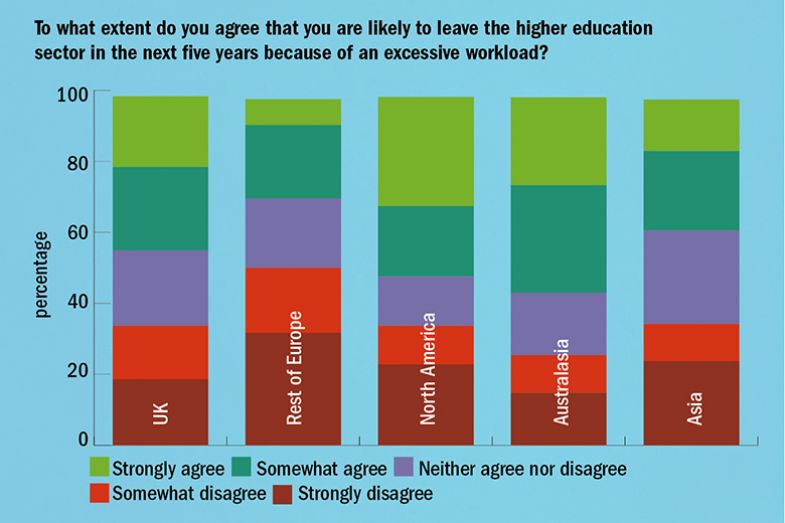
But many academics are conflicted given their sense of vocation. For instance, if she could, one UK-based associate professor in the arts and humanities would leave academia immediately. But, at the same time, “being an academic is hard to let go of because it is hard-won and central to one’s sense of identity”.
Moreover, some are wary of the “grass is greener” view, acknowledging that other sectors have pressures too and that leaving higher education would involve giving up benefits such as flexibility and autonomy.
“I have worked for more than a decade outside academia (eight years as a manager),” says a senior leader in social sciences who works in Denmark. “The workload isn’t lighter, nor is the level of stress.” However, she feels that non-academic organisations are better in areas such as people management and fostering a culture of collaboration between staff.
Solutions
The most common cause for growing workloads over recent years is administration, cited by 32 per cent of respondents. Several comment that academics are now expected to do more administrative tasks because of a reduction in support staff. A female UK-based associate professor of arts and humanities says that dealing with the online administrative systems that have replaced such staff “now makes up the majority of my working day”.
Conversely, a UK-based administrator in programme management says that “a very genuine and very worthwhile move to reduce workload for junior faculty” at her institution has “led to work being transferred to professional services staff. Senior faculty need to pick up more work.”
Increased teaching loads are mentioned by 9 per cent of respondents, with marking/assessment and supporting students both mentioned by 8 per cent. Several respondents comment that students need more help with academic work as they appear to be less prepared for university life, while the demands of hybrid teaching – including recording lectures – are adding to the burden by increasing the amount of preparation time needed.
Asked which aspects of their jobs have got easier in the past three years, 66 per cent say none has. Those who have noticed a slight easing off are most likely to attribute that to less travel (11 per cent).
Given that administration is so heavily blamed for the rise in workloads, it is not surprising that 27 per cent believe that reducing this is the single biggest thing an institution could do to improve work-life balance. However, this comes second to hiring more staff, which, at 43 per cent, is by far the most popular option, especially among professional staff (52 per cent versus 39 per cent of academics). But there is an emphasis in comments on hiring the right staff and investing in training them.
There is little support for capping student numbers (6 per cent) or reducing the number of courses offered (4 per cent). Several commenters suggest investing in improving flaky IT systems.
So what is standing in the way of such solutions? According to many respondents, the answer is clear: senior management. A full 58 per cent disagree that senior management at their institution are supportive of efforts to make workloads more manageable, 32 per cent strongly. Many say their leaders are out of touch and do not make an effort to understand the pressures staff are under. This results in too many ever more expansive strategies, which add to the administrative burden.
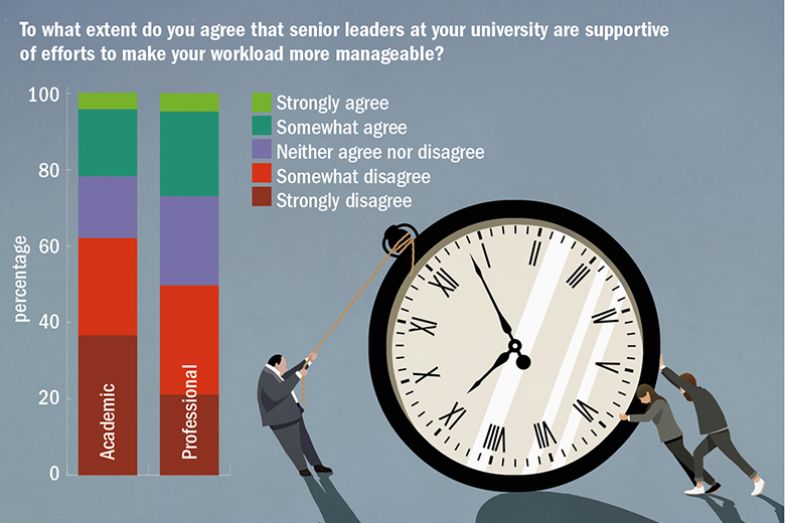
A physiology lecturer in the UK complains that her institution “spends a lot of time changing structure – schools into departments, different faculties merging, moving staff from one faculty to another, having staff re-interview for their previous job roles – new leadership coming in and fixing what is not broken into something that breaks, moving staff from their offices twice in a six-month period, experienced lecturers being given brand new units to write so new staff can take over the units that are established…The list just goes on and on, and this takes up a lot of time, not to mention the outlandish costs.”
But 23 per cent agree that senior leaders are doing their best to reduce the burdens on them, rising to 27 per cent among professional staff. Those in Europe and Asia are more forgiving, recognising that the financial pressures and the competitive nature of their sector are beyond leaders’ control. As a senior UK-based female administrator puts it, “the precarious state of university finances and the requirement to do ‘more with less’ in the public sector generally, combined with the increased need for reporting using systems not fit for the job, make [controlling workloads] much harder than it ought to be”.
Other suggestions for how working cultures could be improved include reducing the number of meetings (“finding smarter ways to make less critical decisions”) and confining them to standard working hours, discouraging staff from replying to emails outside working hours, providing affordable childcare on site, and “working with grant funding bodies to avoid deadlines in or just after school holidays” – with similarly family-friendly internal deadlines.
A senior education lecturer in Mauritius suggests that “when someone has worked a lot more than their expected workload, they should be able to take a semester or two off to do only research work”.
While managers might baulk at it, that is a policy change that would no doubt be widely supported.
POSTSCRIPT:
The respondents
The self-selecting survey was carried out online between 2 and 25 September.
Of the 1,191 respondents, 67 per cent are female and 31 per cent male. The majority (70 per cent) are based in Europe, with 12 per cent in Australasia, 9 per cent in North America, 6 per cent in Asia, 2 per cent in Africa and 1 per cent in South America. Because of the low response rate in Africa and South America, these continents are not considered for continent-level analysis. The UK accounts for the highest number of responses (62 per cent) and, therefore, these responses are considered on their own, separate from the rest of Europe.
The split between academic and professional staff is 68 per cent to 32 per cent. Eight-five per cent classify their contract as permanent, 12 per cent as fixed term, 2 per cent as term-time only and 1 per cent as zero-hours.
Among the academics, 14 per cent are senior leaders, 35 per cent full professors, 26 per cent assistant professors or lecturers, and 7 per cent at the postdoctoral or PhD level.
Register to continue
Why register?
- Registration is free and only takes a moment
- Once registered, you can read 3 articles a month
- Sign up for our newsletter
Subscribe
Or subscribe for unlimited access to:
- Unlimited access to news, views, insights & reviews
- Digital editions
- Digital access to THE’s university and college rankings analysis
Already registered or a current subscriber? Login
